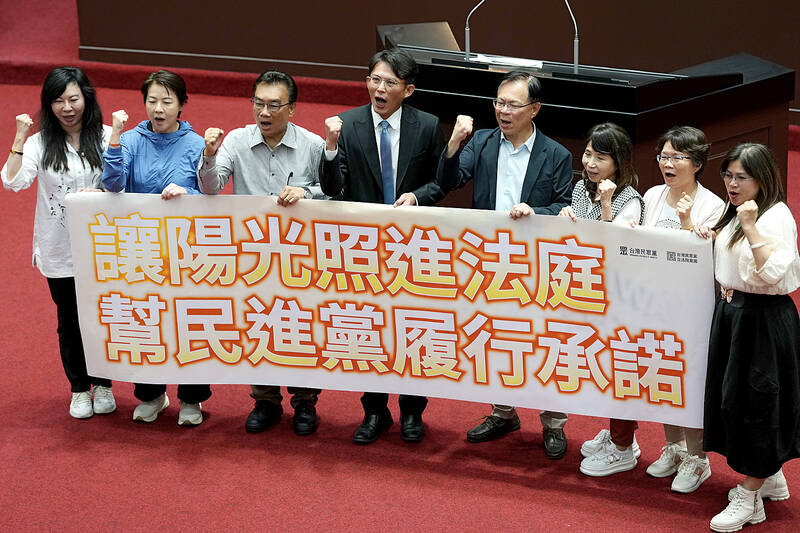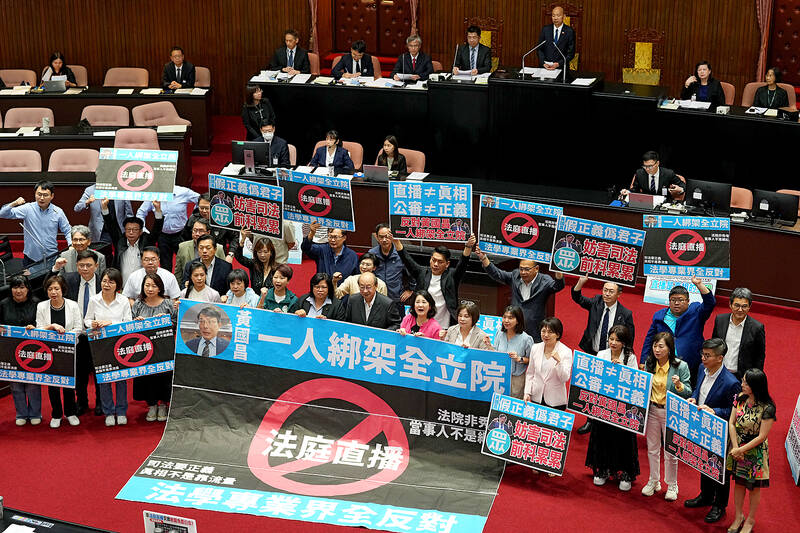The Taiwan People’s Party (TPP) and the Chinese Nationalist Party (KMT) yesterday jointly passed amendments to the Court Organization Act (法院組織法) that would conditionally permit the live broadcasting of court proceedings.
According to the amendments proposed by the TPP, trials in the Supreme Court and its Grand Chambers would be eligible for live streaming except for cases involving national security, public order, social decency, or those that could cause harm to life, body, privacy or commercial secrecy, subject to the court’s approval.
Judicial proceedings at the first and second appellate courts would not be eligible for live streaming, but it could be allowed in exceptional circumstances, such as trials involving cases of interest to the public, the amendments said.

Photo: CNA
However, the broadcast of such proceedings would be required to take into consideration the relation of the case to public interest, the fairness of the trial and how the process would affect the rights of those participating, and could only be broadcast in a manner agreed upon by individuals involved, or in accordance with the ruling of the court, according to the amendments.
Cases to be tried in a closed court, a summary court or small claims court, criminal cases in which the maximum penalty is a prison sentence of five years or less, and cases under the jurisdiction of the Family Act (家事事件法), the Juvenile Justice Act (少年事件處理法), the Intellectual Property Case Adjudication Act (智慧財產案件審理法) and the Commercial Case Adjudication Act (商業事件審理法) are excluded from broadcast, the amendments said.
When trial proceedings are broadcast live, participants could file for, or the court may rule, that recordings — both audio and visual — be altered to prevent direct identification of an individual if they have certifiable cause that the broadcast would endanger their lives, physical safety, freedom, privacy, affect their properties or severely affect the fairness of the trial, according to the amendments.

Photo: CNA
Democratic Progressive Party chief executive Rosalia Wu (吳思瑤) said her caucus objected to the amendments, adding that TPP Chairman Huang Kuo-chang (黃國昌) proposed the amendments to hijack legislative proceedings.
The amendments were tailor-made for former TPP chairman Ko Wen-je (柯文哲), who is facing corruption charges, she said, adding that the amendments were a political deal between the KMT and the TPP.
KMT Deputy Secretary-General Lo Chi-chiang (羅智強) said that the amendments are an opportunity to instill confidence in the judiciary.
Wu should not be afraid of the public or fear injustice based on court proceedings, he said.

Taiwan is to commence mass production of the Tien Kung (天弓, “Sky Bow”) III, IV and V missiles by the second quarter of this year if the legislature approves the government’s NT$1.25 trillion (US$39.78 billion) special defense budget, an official said yesterday. Commenting on condition of anonymity, a defense official with knowledge of the matter said that the advanced systems are expected to provide crucial capabilities against ballistic and cruise missiles for the proposed “T-Dome,” an advanced, multi-layered air defense network. The Tien Kung III is an air defense missile with a maximum interception altitude of 35km. The Tien Kung IV and V

The disruption of 941 flights in and out of Taiwan due to China’s large-scale military exercises was no accident, but rather the result of a “quasi-blockade” used to simulate creating the air and sea routes needed for an amphibious landing, a military expert said. The disruptions occurred on Tuesday and lasted about 10 hours as China conducted live-fire drills in the Taiwan Strait. The Civil Aviation Administration (CAA) said the exercises affected 857 international flights and 84 domestic flights, affecting more than 100,000 travelers. Su Tzu-yun (蘇紫雲), a research fellow at the government-sponsored Institute for National Defense and Security Research, said the air

Trips for more than 100,000 international and domestic air travelers could be disrupted as China launches a military exercise around Taiwan today, Taiwan’s Civil Aviation Administration (CAA) said yesterday. The exercise could affect nearly 900 flights scheduled to enter the Taipei Flight Information Region (FIR) during the exercise window, it added. A notice issued by the Chinese Civil Aviation Administration showed there would be seven temporary zones around the Taiwan Strait which would be used for live-fire exercises, lasting from 8am to 6pm today. All aircraft are prohibited from entering during exercise, it says. Taipei FIR has 14 international air routes and

Taiwan lacks effective and cost-efficient armaments to intercept rockets, making the planned “T-Dome” interception system necessary, two experts said on Tuesday. The concerns were raised after China’s military fired two waves of rockets during live-fire drills around Taiwan on Tuesday, part of two-day exercises code-named “Justice Mission 2025.” The first wave involved 17 rockets launched at 9am from Pingtan in China’s Fujian Province, according to Lieutenant General Hsieh Jih-sheng (謝日升) of the Office of the Deputy Chief of the General Staff for Intelligence at the Ministry of National Defense. Those rockets landed 70 nautical miles (129.6km) northeast of Keelung without flying over Taiwan,